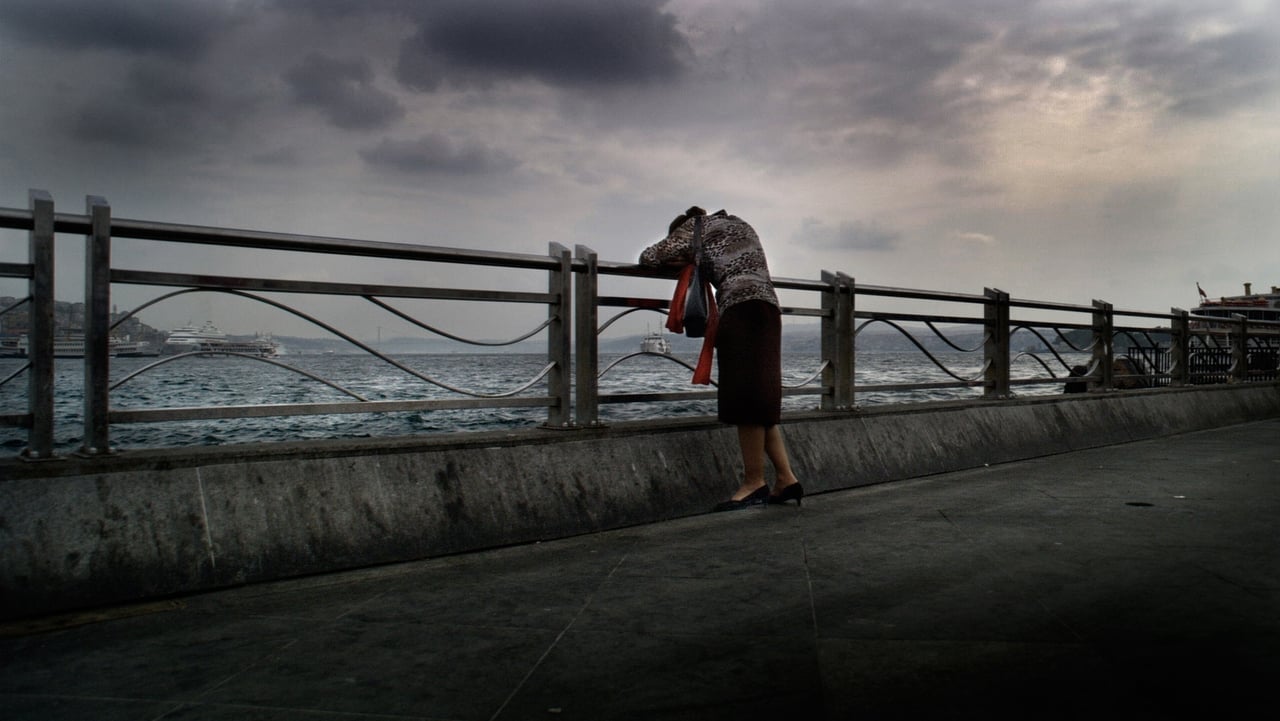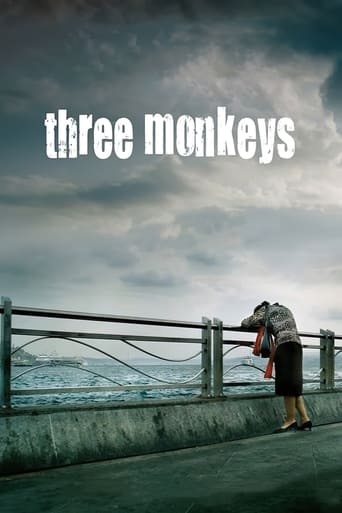

Sorry, this movie sucks
... View MoreA Disappointing Continuation
... View MoreIt’s fine. It's literally the definition of a fine movie. You’ve seen it before, you know every beat and outcome before the characters even do. Only question is how much escapism you’re looking for.
... View MoreI didn’t really have many expectations going into the movie (good or bad), but I actually really enjoyed it. I really liked the characters and the banter between them.
... View MoreThere may not be much dialog in this, but that's offset by a desperation that is anything but silent. In addition, this film is almost always shot in the most grimy light; so as one reviewer already wrote you have the recipes for a "miserabilist's" delight.Unlike that reviewer though, I was quite captivated by this. Some of it surely was the lure of a look into a foreign culture, granted a somewhat lurid look. Still the poverty they are trapped in comes with a fantastic view, and the constant flow of wind helped to keep a somewhat fresh feeling to the trapped dwelling for the main family. I supposed that wind is to remind us of forces we cannot see and we cannot control but yet are constantly at play.I also think the casting was crucial here, via the dual nature of the faces. The son who wanting to project street tough, often looks like a sheepish 13-year old. The father whose macho exterior belies the fact that he's powerless. And the mother, who was a tremendous choice, the make-up and lighting help to accentuate that she is worn-out, but the glimmer of her beauty in decline and her desire for some joy to shine out of her tired eyes make her as stark a contrast as the lighting in the film. Her cell phone ring cries out for her, a long gone Turkish love pop song souring.And I'm leaving off Ercan Kesal as the political functionary who connects all three as each member of the family makes a bad decision involving him. His weasel-y nature is communicated also without words.I like that the filmmaker does not need to cement the unity of this family with specific on-screen action, even as their mistakes push the family towards fragmentation. Blood remains thicker than water in every nation, although an aquatic apparition is summoned. It connects them but does it also condemn them to fragmentation? A film about scary sacrifices in gorgeously ghastly light.
... View MoreWhat makes an art-house film? Well, sometimes you watch a mainstream movie and it's nicely paced, smartly scripted, easy on the eye, but altogether, it's just too slick to get far beneath the skin. But sometimes, a director has a real vision of his movie, a sense of how to make his scenes count beyond the normal cinematic vocabulary; and it's these films that tend to linger longest in the mind. And Nuri Bilge Ceylan's film 'Three Monkeys' might seem to be one of the latter kind: certainly, he has clearly thought very hard about how to compose every shot in this movie. Unfortunately, his choices are, when taken as a whole, rather perverse: when almost every scene is shot from a static camera, either too close or too distant for us to see what we might be used to seeing in movies (faces, for example), the impact of an individual choice of shot is lessened; but the sense of disengagement from the audience heightened. The minimal dialogue, and all-round feeling of ennui, didn't help either: there's a plot here, and even some moments of supposedly high tension, but it's all drowned in a mood of intense but lethargic miserablism. By the end, I had lost both interest in and the details of the story. And I'm a miserablist myself, as a rule. If you like blockbusters, you'll certainly get no change from this movie.
... View MoreAs my friend Jeremy Fassler says, the film Three Monkeys "would be much better if it had some actual monkeys". In fact, from the title, one expects a Pixar film about three monkeys that have some kind of adventure. At least that would be an enjoyable way to spend 109 minutes. The set-up for Nuri Bilge Ceylan's Three Monkeys is indeed an interesting one; a politician in the midst of an election runs over someone and pays his driver to take the blame. The action seems to have a potential for a thrilling film, but Ceylan only explores this conflict for the first half hour. Ceylan doesn't explore anything of interest to the audience and wastes rolls and rolls of film on the minutia of everyday life, filling the screen with people constantly sitting and doing things that have no meaning. He places different conflicts throughout the film, but they are never fully explored and are few and far between. For example, at one point in the film, the son of the driver who took the blame for the car accident comes home bloodied and bruised. His mother simply looks at him. There is no explanation of what happened and why. Even at the end of the film, the audience has no idea who the characters are, what there backgrounds are, and what their mutual history is. What Ceylan has created here is a slow and boring look at everyday life. Ceylan seems willing to let the story be told by having his actors sit, and stare. He fails to realize that watching other people do unimportant things does not make for an interesting film. Ceylan's direction isn't bad, but it isn't good either. At times he just turns the camera on and he cannot figure out how to involve the audience in the film. The shots he uses are nothing special and nothing sticks out. The cinematography gives the film a very distinct look. But every shot in the film looks the same, and after a while, it stops being interesting. The only part of the film that works is the acting. All the performances are good, but because Ceylan doesn't explore any of the characters, there is nothing for the actors to convey to the audience as a way of involving the viewer. As a result, the audience feels alienated from the characters and doesn't care what happens. Three Monkeys attempts to be an intense and involving character study. Instead it comes off as pretentious and flat. Ceylan tries to milk as much drama out of Three Monkeys, but this cow is all dried up. This is evidenced by the final shot of the film; the main character, seen from afar, stands outside as it begins to rain. Ceylan is wrong director for this film (regardless of the fact that he co-wrote it). He seems interested in emotional drama and doesn't realize what type of film Three Monkeys needs to be. A film with a plot like this can go either one of two ways; it can either explore the conflict the main character creates and the direct consequences, or it can show what happens when all the dust settles. Unfortunately, Nuri Bilge Ceylan's Three Monkeys takes the latter. C+
... View MoreAs a kind of cultural globalization takes over world cinema, one should be grateful for directors such as the Hungarian Béla Tarr, the Romanian Cristian Mungiu, the Iranians Abbas Kiarostami and Bahman Ghobadi and the Turkish Nuri Bilge Ceylan who keep alive a personal, regional and stylistically individual form of film-making. Their work is never likely to become widely popular at home or abroad, but they're beacons of hope for the future of a troubled art.A photographer by profession, Ceylan turned to film-making in the mid-90s and works largely with non-professional actors and small budgets. He belongs in the tradition of Tarkovsky, Bergman, Antonioni, Angelopoulos and other masters that seemed in the 60s and 70s to be on the point of becoming a new or, at least, parallel mainstream but has now been marginalised. His new film, The Three Monkeys, like its two predecessors, won a major award at Cannes, in this case the prize for best director, and it begins with that familiar dramatic device for the creation of tension, guilt and dangerous consequences - the hit-and-run accident.Here, a man kills a pedestrian at night on a country road. It transpires that he is a politician, Servet, and in order for the event not to affect a forthcoming election he bribes his driver Eyüp, who wasn't with him on this occasion, to take the rap. He'll go on getting paid during his nine-month sentence and at the end will receive a decent pay-off.The title is a reference to the Sino-Japanese image of the three wise monkeys who see no evil, hear no evil, speak no evil, suggesting this film is a moral fable about the consequences of evasion, corruption and suppression. Servet thinks he's doing what's best for his party and the country: he's a supporter of Prime Minister Erdogan and the occasion is the 2007 general election that ended in a landslide victory. Eyüp believes he's acting like a good servant, but, more important, he's getting the money that will get a better home for his handsome wife Hacer and provide for the education of his teenage son Ismail.Nothing good comes of these actions. One way and another, everyone's life is affected, indeed in some measure destroyed, but like much else in the film the judgments are left to the viewer. Are we dealing with national problems of widespread social corruption, with the weaknesses of a set of individuals or the operation of a malignant fate of a kind that stalks us all? From the start, Ceylan draws us into the very narrative fabric. In the opening scene, using silence, long takes, available light and dramatic compositions, he makes us ask questions about what we are seeing. Who is this man? What has he done? How will he react? There are long gaps in time between individual sequences and seemingly important facts are never made plain.Ismail comes home with a badly cut hand and a bruised face, but he never reveals to his mother, or to us, whether these wounds came from brawling or from political demonstrations. They have the effect, however, of persuading her to visit the politician and seek an advance on the bribe to buy a car for the boy. This in turn leads to an affair, which is only discovered when Ismail returns home early to find his mother making love to Servet. When Eyüp emerges from jail, he's furious about the car and his suspicions over his wife's infidelity seem confirmed by a message on her cell phone. For most of the film, the images are desaturated, but during the scene of reunion, Hacer is wearing a red slip, which both excites her husband and drives him to violence.In the family's background is the death of another son, some 15 years earlier, and his father and surviving brother are haunted by visions of this loss. In the future lies a repetition of the incident that launches the film, only here the conspiracy is initiated by Eyüp. Though perhaps not quite as good as Climates, Ceylan's last picture, this is a film of formidable power that sticks in the mind.Two sequences in particular stand out. In one, the politician rejects the obsessed Hacer with great brutality, but the camera is placed nearly 50 yards away across a field. In the other, the film's closing long shot, the husband stands on the balcony of their ramshackle apartment block to the south of Istanbul, his back to the camera, looking out over the Sea of Marmara as an electric storm begins to stir.
... View More